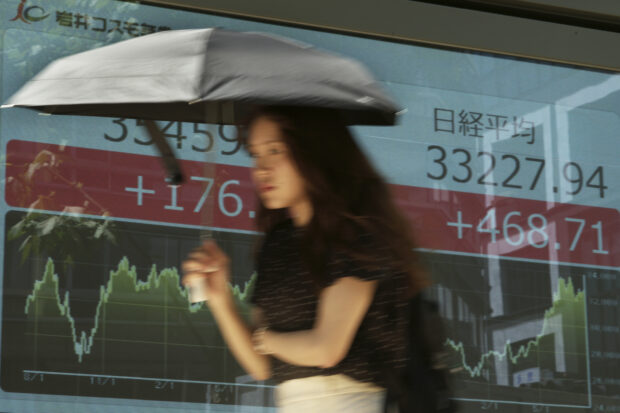
A woman walks past monitors showing Japan’s Nikkei 225 index at a securities firm in Tokyo, Monday, July 31, 2023. Shares were mostly higher in Asia on Monday after Wall Street got back to climbing following more encouraging profit reports and the latest signal that inflation is loosening its chokehold on the economy. (AP Photo/Hiro Komae)
TOKYO — Asian shares mostly rose Tuesday, boosted by market optimism set off by a Wall Street rally despite lingering worries about inflation and regional growth.
Investors were also watching for the policy decision by the Reserve Bank of Australia. Some forecasters are expecting a hike, but analysts at ING Economics said that wasn’t likely.
“With the RBA keen not to overdo the tightening, it seems unnecessary to hike today when in all likelihood the macro signals for hiking will look much stronger at the September meeting,” said Robert Carnell, Asia-Pacific regional head of research.
Japan’s Nikkei 225 surged 0.7 percent in morning trading to 33,418.53. Australia’s S&P/ASX 200 gained nearly 0.4 percent to 7,436.70. South Korea’s Kospi jumped 1.3 percent to 2,667.03. Hong Kong’s Hang Seng was little changed, edging down less than 0.1 percent to 20,068.66, while the Shanghai Composite shed 0.1 percent to 3,286.34.
Wall Street closed out its latest winning month, with the S&P 500 adding 6.73 points, or 0.1 percent, to 4,588.96 to cap its fifth straight month of gains. That’s its longest winning streak in nearly two years, and the index is at a 16-month high after rallying on hopes cooling inflation will mean the economy can avoid a long-predicted recession.
The Dow Jones Industrial Average climbed 100.24, or 0.3 percent, to 35,559.53, and the Nasdaq composite rose 29.37, or 0.2 percent, to 14,346.02.
To be sure, critics have been saying Wall Street’s seemingly growing consensus for a soft landing for the economy has come too quickly. Several reports in the coming week could poke holes in the theory that inflation will keep coming down enough for the Federal Reserve to not only stop hiking interest rates, but to begin cutting them by early next year.
Big names in the market, such as Rob Arnott at Research Affiliates, are warning not to be “overly hasty in popping the champagne corks.” Arnott sees the possibility of inflation rebounding again later this year, even though it’s recently cooled considerably.
Fed Chair Jerome Powell has pointed to Friday’s upcoming report on the overall U.S. job market as an important data point. Growth needs to be strong enough to keep a lid on worries about a possible recession. But a reading that’s too hot could also mean upward pressure on inflation, which could push the Fed to get more aggressive about rates.
High rates undercut inflation by slowing the overall economy and dragging on prices for stocks and other investments. The Fed has already hiked its main rate to its highest level in more than two decades, a jolting shock after the rate began last year at virtually zero.
Two of Wall Street’s most influential stocks are also set to report their earnings for the spring: Amazon and Apple are both scheduled to release their latest quarterly results on Thursday. Because they’re two of the most massive stocks on Wall Street, their stock movements pack much more punch for the S&P 500 and other indexes than other stocks.
Both stocks have soared this year, in part on expectations for strong continued growth, and they’ll need to deliver to justify the big moves. Both Apple and Amazon are up more than 50 percent so far this year.
Roughly halfway through the earnings reporting season, more companies than usual have topped analysts’ profit expectations, according to FactSet. Companies also seem to be more optimistic about their upcoming results, giving better-than-expected forecasts more often than usual, according to strategists at Bank of America.
“While economic uncertainty remains, we believe the profit cycle is inflecting higher,” the strategists wrote in a BofA Global Research report.
In the bond market, U.S. Treasury yields slipped after a report suggested manufacturing in the Chicago region is weakening a bit more than economists expected. Manufacturing has been one of the hardest-hit areas in the economy by high interest rates, which work with a notoriously long lag effect.
The yield on the 10-year Treasury edged down to 3.95 percent from 3.96 percent late Friday.
In energy trading, benchmark U.S. crude lost 19 cents to $81.61 a barrel. Brent crude, the international standard, rose 57 cents to $85.56 a barrel.
In currency trading, the U.S. dollar edged up to 142.62 Japanese yen from 142.24 yen. The euro cost $1.0983, down from $1.0993.

